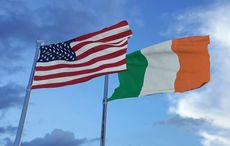An Irish immigrant who was one of the first professional baseball players in the United States lies in an unmarked grave in Boston. His grandson is hoping to raise enough money for a grave marker by auctioning his baseball contracts, which are among the oldest known in existence.
“He was one of the original boys of summer and we need to do what we can to promote his legacy,” said 82-year-old Boston native Charles McCarty, speaking of his grandfather.
Andrew Jackson Leonard was born in County Cavan, Ireland, in 1846. When he was two years old, he moved to the United States with his mother and siblings to escape the famine. The family settled in Newark, NJ.
Leonard showed talent as a baseball player. In 1869, he played for the Cincinnati Red Stockings, baseball’s first professional team.
In 1871, he signed a contract to play for the Washington Olympics.
This contract is a significant artifact, said Chris Ivy, director of sports at Dallas-based Heritage Auctions, which is handling the sale.
The contract was signed at a time when there was a debate over whether baseball should pay its top players or remain amateur. The 40-word contract is written on U.S. Treasury Department letterhead and signed by the acting Treasury secretary. It promises Leonard $720 for one year to be a department messenger. The $720 is nearly double what a government messenger made annually in the 1870s.
“Andy didn’t do a lick of work for the Treasury,” says McCarty, Leonard’s grandson.
Ivy told the Cape Cod Times, “That contract sheds light on what’s long been believed but not proven, which was that there were professional baseball players posing as amateurs who were getting paid under the table for no-show jobs, and this is tangible evidence that the government was involved.”
Leonard played one season with the Olympics then moved to the Boston Red Stockings, where he played seven seasons and helped the team win six pennants.
The Red Stockings would eventually become the Boston Braves.
Leonard died in 1903 at the age of 57. He is buried in New Calvary Cemetery in Boston.
Leonard’s contracts and a diary he kept during an 1874 baseball tour to England and Ireland could fetch at least $100,000 at auction on Feb. 20, said Ivy.
John Thorn, the official historian of Major League Baseball, said that Leonard deserves a spot in the pantheon of the game’s pioneers.
“Leonard was a very good player, not a great player, but the fact he was recruited to become a charter member of the Cincinnati Red Stockings makes him an important historical figure,” he said. “I am entirely behind the idea of marking his grave.”
Leonard’s legacy also lives on in his homeland – the MVP award for the modern-day Irish national baseball league is named for after him.




Comments